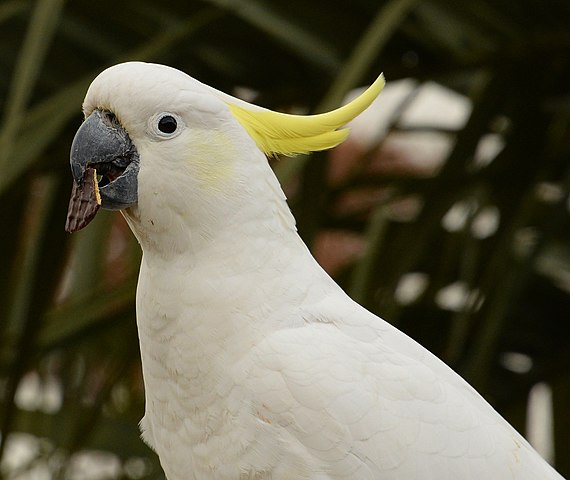One of the most common complaints from Sulphur Crested cockatoo owners is screaming and screeching. It’s true, Sulphur Crested Cockatoos are noisy birds but that doesn’t mean screaming during all hours of the day.
Other common behavior concerns are biting and feather plucking. Let’s take a look at them individually to discuss causes and possible tools to eliminate the behavior.

Screaming
Yep, we might as well dive right into the most common complaint. Sulphur Crested Cockatoos are screamers. Generally, you’ll find that our bird is noisiest in the morning and in the evening. This is a natural behavior. In the wild Sulphur Crested Cockatoos live in flocks and this early morning and late evening chatter come from basic social communication.
Often, this screeching and screaming can carry over into the day. This type of screaming isn’t acceptable and can be eliminated depending on the cause. There are several causes for screeching in cockatoos.
As you probably already know, the Sulphur Crested Cockatoo is a very affectionate, and sometimes needy, bird. They need you to spend time with them every day. They form strong bonds and if they feel they’re being neglected, screaming can be one way to get your attention.
Jealousy is another cause of Sulphur Crested Cockatoo screaming. They form strong bonds with their owners and even something as simple as a delivery person coming to your home can strike a chord of jealousy in them. You’re paying attention to someone else! They’re smart and boredom is another cause of screaming. Before you go about trying to determine your Sulphur Crested’s emotional state, take a look at their environment. Are they getting enough sleep? Is their cage in a safe and optimal location?
Are they getting a proper diet with plenty of fruits and vegetables? Is your Sulphur Crested Cockatoo getting enough time out of their cage? Are they properly socialized to not fear you and other family members? One of the tools that are all-encompassing as a solution to screaming and other behavior problems, provided your Sulphur Crested Cockatoo is getting great care, is trick training. Trick training provides them a structure, it stimulates their mind, helps to strengthen the bond between your cockatoo and anyone that trains them, and it helps to establish the rules of the home.
Biting
Another behavior problem owners of Sulphur Crested Cockatoos may deal with is biting. This behavior often creeps up as the bird is approaching sexual maturity and feeling a bit crankier than usual. One minute your cockatoo is fine and the next minute they’re taking a chunk out of your finger.
Before you hit your bird, throw them, drop them, or place them in isolation, please don’t do any of those or you’ll make the behavior worse, remember that the biting behavior is your bird’s way of telling you they are unhappy. Your job, as the loving and patient owner, is to teach your bird a different way of communicating. Again, take a look at their environment and determine what causes your bird to bite. Remedy what you can to make their environment optimal and then spend time training them.
Training will teach your bird other methods of communication and it will reduce or eliminate many of the things that cause your bird to bite you in the first place. It is also important to note that every time you have a strong reaction to any bad behavior it only serves to encourage the behavior. Yelling, pulling back, and throwing water are considered strong reactions.
Feather Plucking
This is the last biggie behavior problem that you’re likely to deal with as a Sulphur Crested Cockatoo owner. If your cockatoo is pulling their feathers out, take them to an avian veterinarian.
There are often medical reasons behind the behavior and it is critical to the health and survival of your bird that these issues are addressed first. If the underlying cause of your cockatoo’s feather plucking is behavioral then as you would with any bad behavior, determine the cause and spend time training your bird. Take the time to provide your Sulphur Crested Cockatoo plenty of stimulation during the day by giving them toys. Make sure they get plenty of good sleep and quality nutrition and that their environment is calm and secure.
